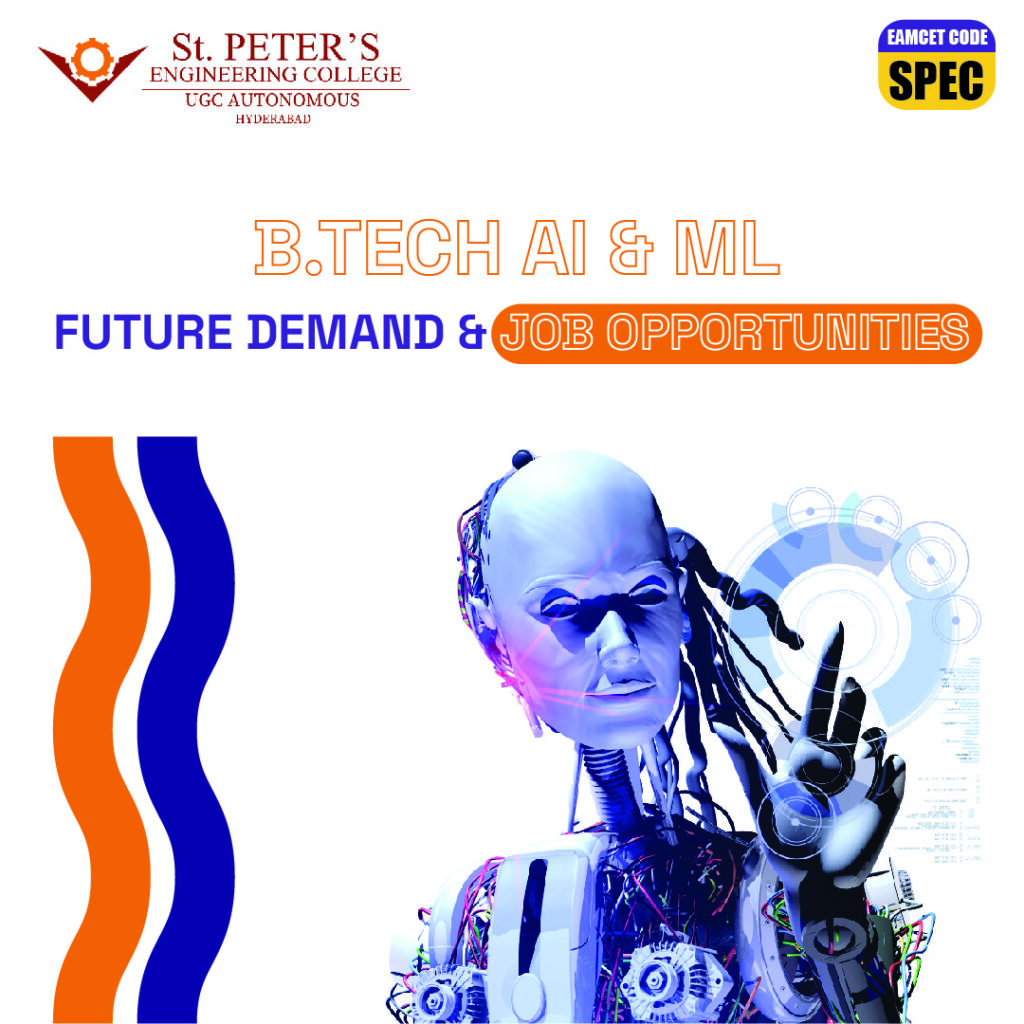B.Tech AI & ML Future Demand & Job Opportunities

Artificial Intelligence (AI) and Machine Learning (ML) are two fields that hold immense promise in today’s ever-evolving technological landscape. This convergence has revolutionized industries worldwide, creating exciting career prospects for B.Tech graduates. Let’s explore the future demand and job opportunities in AI and ML, offering a glimpse into the possibilities that await those embarking on this thrilling journey.
Demand for AI and ML Professionals:
Several key factors contribute to the growing demand for AI and ML professionals:
- Growing Adoption: Organizations across diverse sectors are increasingly recognizing the transformative potential of AI and ML. From finance and healthcare to retail and manufacturing, businesses are incorporating AI-driven solutions to gain a competitive edge. As a result, the demand for professionals who can develop, implement, and optimize AI and ML systems is on the rise.
- Data-Driven Decision Making: Data has become a valuable asset for companies, and AI and ML technologies enable organizations to extract valuable insights from vast amounts of data. Skilled professionals who can navigate complex datasets, analyze trends, and develop predictive models are in high demand to support data-driven decision-making processes.
- Automation and Efficiency: AI and ML technologies offer opportunities for automation and process optimization. Industries are leveraging these technologies to automate repetitive tasks, enhance operational efficiency, and reduce costs. As organizations strive for streamlined operations and improved productivity, the need for AI and ML professionals who can design and deploy intelligent automation solutions continues to grow.
- Personalized Experiences: Personalization is highly valued in today’s consumer-centric world. AI and ML algorithms enable organizations to analyze customer preferences, behavior patterns, and purchase history to deliver personalized recommendations, tailored advertisements, and targeted marketing campaigns. Professionals skilled in AI and ML play a crucial role in developing personalized experiences that enhance customer satisfaction and drive business growth.
- Innovation and Research: The field of AI and ML is constantly evolving, pushing the boundaries of innovation. Organizations invest in research and development to stay ahead of the competition and discover novel applications for AI and ML. This fuels the demand for AI and ML professionals who can contribute to cutting-edge research, develop advanced algorithms, and pioneer new technologies.
- Addressing Complex Challenges: AI and ML have the potential to address complex challenges in various domains, such as healthcare, climate change, transportation, and cybersecurity. From diagnosing diseases to optimizing energy consumption, AI and ML solutions offer new perspectives and approaches to tackle societal issues. Skilled professionals with domain expertise and AI knowledge are sought after to develop innovative solutions to these challenges.
Job Opportunities:
- Cognitive Engineer: Cognitive engineers focus on designing intelligent systems that can perceive, learn, and interact with their environment. They combine AI and ML techniques with human cognition principles to develop advanced applications like virtual assistants, smart homes, and autonomous vehicles. Cognitive engineers play a crucial role in shaping the future of AI-driven technologies.
- Data Architect: Data architects lay the foundation for successful AI and ML implementations. They design robust data infrastructures, develop data pipelines, and ensure efficient data management. With their expertise in data modeling and optimization, data architects enable organizations to leverage AI and ML algorithms effectively.
- AI Ethicist: As AI becomes deeply integrated into our lives, ethical considerations become paramount. AI ethicists work at the intersection of technology and morality, addressing complex issues related to bias, fairness, privacy, and accountability in AI systems. Their role involves guiding organizations in developing responsible AI frameworks and policies.
- AI Product Manager: AI product managers possess a unique blend of technical expertise and business acumen. They bridge the gap between development teams and stakeholders, defining AI product roadmaps, prioritizing features, and ensuring successful product launches. AI product managers understand market demands and harness AI capabilities to deliver innovative solutions.

